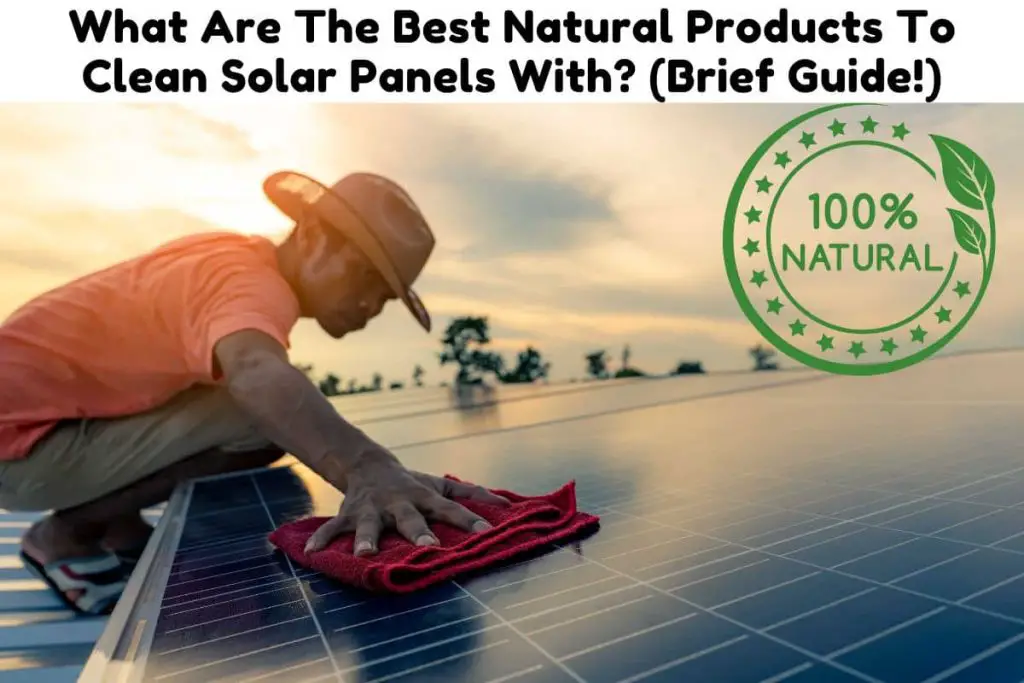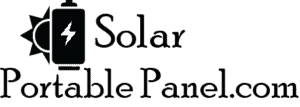A thin layer of dust can reduce the output of a solar system by up to 60%. Dirt is one of several ways in which the efficiency of a solar system is reduced.
Water is by far the best thing to use to clean solar panels with chiefly because it’s always there if needed. Another reason is it introduces fewer unknown chemical agents that may have unexpected side effects on the solar panel.
Ensuring solar panels are installed in the proper place and at the right orientation and tilt is the best way to get the most out of a solar system. Proper maintenance of solar panels is the second best. The simplest but possibly the most effective way to maintain solar panels is to keep them dirt free.
In this article, we look at two popular domestic products, namely vinegar and Simple Green, and whether you can use them to clean solar panels. We will also look at some safety issues around cleaning solar panels.
On a side note! If you’re in need of a reliable and high-performance portable solar panel, We strongly recommend the Jackery SolarSaga 100W Portable Solar Panel (Amazon Link).
With a high conversion efficiency and foldable design, this solar panel is easy to transport and set up, making it perfect for outdoor activities like camping, hiking, and RV trips.

The US solar cell technology used in this panel ensures that you get the most efficient and reliable solar charging possible.
There is also a 60W option that is more affordable (Amazon Link)

Can You Use Vinegar To Clean Solar Panels?
The acetic acid in vinegar makes it ideal to use to clean solar panels. The acid will break down caked grime from organic waste. Vinegar will also introduce fewer unknown compounds compared to using a household cleaner.
Aside from solar panels, vinegar can also be used to clean the tubes in a solar water heater. It is especially effective for breaking down lime buildup in solar water heaters.
Vinegar can be used to wash off sap from maples or firs along with other types of residue. If you’re worried about how the acid might affect the solar panel, there is the option of diluting the vinegar to produce a weaker concentration. Here’s how to wash your solar panels with water:
- Typically, white vinegar with less than 10 percent acid is best.
- Dilute it with water and use a spray gun to apply it to the surface of the solar panel.
- Wipe the spray with a clean soft cloth or squeegee until you get all the dirt off.
- Rinse with plain water if necessary.
Compared to household cleaners, vinegar has the advantage in that it does not contain chemical agents that might cause discoloration or film buildup that will reduce the absorption of the solar panel.
We also highly recommend that you check out our post “What Can You Clean Solar Panels With? Efficient & Cheap Methods!“
Can You Use Simple Green To Clean Solar Panels?
Simple Green is a general-purpose household cleaner. While it’s meant for domestic use, it can also be used to clean dirt, grime, and residue from a solar panel.
Household cleaners are especially useful for removing organic waste like bird droppings that plain water might not easily remove. A key thing to avoid when washing solar panels is applying too much pressure or using tough material that might scratch the glass cover of the solar panel.
Most household cleaners contain chemical agents that break down organic waste. This is the advantage they have over plain water which might struggle with droppings or plant resin. There are two ways to use cleaners with solar panels.
The first is to use them directly on the solar panels. The advantage of doing it this way is that it gives you a stronger concentration of the cleaner. This is especially useful if you’re dealing with solar panels with a lot of plant or animal waste on them.
The disadvantage is you may be introducing harsh chemical agents that might harm the protective glass cover of the solar panel.
The second and safer method is to dilute the cleaner. This gives you a less concentrated cleaner. It may not be as strong as an undiluted mix but with this method, you have the peace of mind that there is less chance of the cleaner having an unwanted effect on your solar panels.
But what if you do not want to take the chance of using a cleaning agent and water just isn’t doing the job? What alternative can you use?
Do Solar Panels Work Better When Cleaned?
Clean solar panels will produce more solar energy. Dirt over the solar panels will reduce the amount of sunlight they absorb and affect the solar energy output. On average, clean solar panels perform up to 3.5% more efficiently.
Several studies have been done to investigate the effect dirt can have on solar panels. In one such study, researchers found that dust can reduce the efficiency of solar panels by as much as 60 percent. Source
How often should you clean solar panels?
Solar panels should be inspected and cleaned every six months. At the very least this can be reduced to once a year. It largely depends on the amount of rainfall in the location. Residences in locations that receive high rainfall may require no washing at all.
Inspections should still be carried out to check if its necessary and also to assess the condition of other factors like the wiring or mounting of the solar panels.
Can You Get Electrocuted Cleaning Solar Panels?
Electrocution while cleaning solar panels can happen. The simplest way to avoid this happening is to make sure the solar system is off and there is no voltage or current being produced before proceeding to clean the solar panels.
A power outlet produces around 2,400 watts. A 5kW solar system produces 5,000 watts. Residential solar systems produce enough power to kill or seriously injure. Commercial solar systems are much larger so they produce far more. A solar system works at up to 600 volts depending on how it’s configured. Source
Do Solar Panels Need To Be Turned Off When Cleaning?
Turning solar panels off while cleaning them is a necessary safety precaution. Solar panels are live electrical equipment that can electrocute anyone working on them if they are not shut down.
A solar system has a shutdown procedure for turning it off. In general, these are the steps you follow to shut it down.
- The first step is to turn off the power going out from the inverter. The main switchboard should have an inverter AC supply or AC isolator. Turn it off. If it has two, as in a grid-tie system turn both off. Once you turn off the AC breaker, your solar system will stop supplying electricity to the grid.
- The next step is to turn off the power going into the inverter. This is the PV array DC isolator or DC breaker switch on the inverter. Again, there might be more than one. Turn them to the off position.

